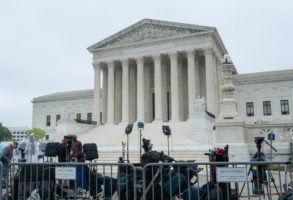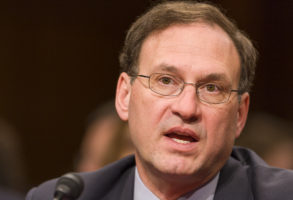
Published July 10, 2020
The closest thing social conservatives and evangelical supporters of President Donald Trump had to a conversation stopper, when pressed about their support for a president who is so manifestly corrupt, cruel, mendacious, and psychologically unwell, was a simple phrase: “But Gorsuch.”
Those two words were shorthand for their belief that their reverential devotion to Trump would result in great advances for their priorities and their policy agenda, and no priority was more important than the Supreme Court.
Donald Trump may be a flawed character, they argued, but at least he appointed Neil Gorsuch to the Supreme Court.
And then came Bostock v. Clayton County, Georgia.
That is the case decided in mid-June in which the majority opinion, written by Justice Gorsuch, protected gay and transgender individuals from workplace discrimination, handing the LGBTQ movement a historic victory.
“An employer who fires an individual merely for being gay or transgender defies the law,” Gorsuch wrote for the majority in the 6–3 ruling.
It was a crushing blow for the religious right, and it must have dawned on more than a few of Trump’s evangelical supporters that if Hillary Clinton had won the presidency, the outcome of the case would have been the same; the only difference is that the margin probably would have been 7–2.
The Bostock case was not the only major legal setback for social conservatives and evangelical Christians. By a 5–4 margin, the Court—in June Medical Services v. Russo—delivered a significant defeat to the pro-life movement, striking down as unconstitutional a Louisiana law that could have left the state with only a single abortion clinic. This dashed the hopes of those who were counting on Trump’s appointees to lead the Court in overturning Roe v. Wade. (Both of Trump’s Supreme Court choices were in the minority.)
Social conservatives can point to some important religious–liberty victories. But overall, this term was a judicial gut punch for the president’s evangelical supporters. The “but Gorsuch” argument has not been destroyed, but it has been substantially weakened.
“The GOP gives social conservatives little or nothing legislatively, and hasn’t for a very long time,” the conservative blogger Rod Dreher told Vox’s Jane Coaston. “True, they have blocked some bad things over the years. That’s not nothing. But I think we’ve always known that judges are the real deal here.”
“Every institution—the media, academia, corporations, and others—are against us on gay and transgender rights, and GOP lawmakers are gutless. The only hope we had was that federal judges would protect the status quo. Now that’s gone.”
Legislatively, Trump, compared with other presidents, has not achieved all that much for the pro-life cause and religious-liberties protection. For example, George W. Bush’s pro-life record is stronger and Bill Clinton achieved more in the area of religious liberties, signing into law the Religious Freedom Restoration Act and the Religious Land Use and Institutionalized Persons Act. (Trump has done a fair amount administratively for the pro-life cause.) Trump has also achieved next to nothing in terms of enacting education reforms.
Elsewhere, Trump has engaged in a bromance with North Korea’s Kim Jong Un, the worst persecutor of Christians in the world, and established more intimate and admiring relationships with many of the world’s despots than with leaders of America’s traditional allies. And on issues that have traditionally concerned conservative evangelicals, such as fiscal responsibility and limited government, Trump has been awful: The deficit and the debt exploded under his watch, even pre-pandemic.
Based strictly on the standard of advancing causes that conservative evangelicals most care about, a fair-minded assessment of the Trump record is that some important things were achieved, especially in appointing federal judges. That clearly would not have happened in a Hillary Clinton presidency. But in virtually every other area, including the outcome of several key Supreme Court decisions, Trump has fallen short of the promises and expectations.
Now think about what the cost has been of the uncritical support given to Trump by evangelical Christians. For now, focus just on this: Christians who are supporters of the president have braided themselves to a man who in just the past few days and weeks tweeted a video of a supporter shouting “white power” (he later deleted it but has yet to denounce it); attacked NASCAR’s only Black driver, Bubba Wallace, while also criticizing the decision by NASCAR to ban Confederate flags from its races; threatened to veto this year’s annual defense bill if an amendment is included that would require the Pentagon to change the names of bases honoring Confederate military leaders; referred to COVID-19 as “kung flu” during a speech at a church in Phoenix; and blasted two sports teams, the Washington Redskins and the Cleveland Indians, for considering name changes because of concerns by supporters of those franchises that those team names give undue offense.
These provocations by the president aren’t anomalous; he’s a man who vaulted to political prominence by peddling a racist conspiracy theory that Barack Obama wasn’t born in the United States—he later implied that Obama was a secret Muslim and dubbed him the “founder of ISIS”—and whose remarks about an Indiana-born judge with Mexican heritage were described by former House Speaker Paul Ryan as “the textbook definition of a racist comment.”
The white supremacist Richard Spencer, describing the neo-Nazi and white-supremacist march in Charlottesville, Virginia, told The Atlantic, “There is no question that Charlottesville wouldn’t have occurred without Trump. It really was because of his campaign and this new potential for a nationalist candidate who was resonating with the public in a very intense way. The alt-right found something in Trump. He changed the paradigm and made this kind of public presence of the alt-right possible.” And David Duke, the former Ku Klux Klan leader, called the march a “turning point” for his own movement, which seeks to “fulfill the promises of Donald Trump.”
For his whole life, before and since becoming president, Trump has exploited racial divisions and appealed to racial resentments. The president is now doing so more, not less, than in the past, despite the fact—and probably because of the fact—that America is in the grips of a pandemic that he and his administration have badly bungled and that has claimed more than 130,000 American lives.
As The New York Times’ Maggie Haberman pointed out on July 6, “Almost every day in the last two weeks, Mr. Trump has sought to stoke white fear and resentment.”
White evangelicals are the core of Trump’s political support, and while the overwhelming number of the president’s evangelical supporters may not be racist, they are willing to back a man who openly attempts to divide people by race. That would be enough of an indictment, but the situation is actually a good deal worse than that, since Trump’s eagerness to inflame ugly passions is only one thread in his depraved moral tapestry.
My hunch is that at the beginning of this Faustian bargain, most evangelicals didn’t imagine it would come to this, with them defending the indefensible, tarnishing their reputations, and doing incalculable damage to their causes.
This is the worst year for America in more than a half century; a stunning 87 percent of Americans are dissatisfied with the way things are going and only 17 percent feel proud when thinking about the state of the nation, while 71 percent feel angry and 66 percent are fearful. Donald Trump’s presidency is so polarizing and such a catastrophe that a plurality or outright majority of Americans now oppose much of whatever he supports. The mood of the public is the most progressive it’s been in nearly 70 years. During the Trump era, the nation has moved to the left on a whole series of issues, including those that matter most to evangelical Trump supporters.
The Trump presidency, which has produced few significant legislative or governing achievements, has inflicted gaping wounds on the Republican Party, conservative causes, and the evangelical movement.
In his marvelous book The Narnian: The Life and Imagination of C. S. Lewis, Alan Jacobs tells about the theater critic and essayist Kenneth Tynan, who, after reading Lewis’s The Hideous Strength, said, “How thrilling he makes goodness seem—how tangible and radiant!” (At Oxford, Lewis was a tutor to Tynan, who was not himself a believer.)
Tynan perceived something essential about Lewis. One of his most impressive qualities was his ability to present the good life—and his Christian faith, which shaped his understanding of the good—as tangible and radiant, a thrilling and captivating journey, a way to find joy and fulfillment.
That was hardly the whole story. Lewis faced a crisis in faith late in his life, when he was overwhelmed by grief after his wife, Joy Davidman, died of cancer—a crisis he recovered from, but that left its mark. Still, because of his faith, Lewis’s life was more alluring, more captivating, more vivifying. It was said of Lewis and J. R. R. Tolkien that they never lost their enchantment with the world.
The greatest cost of the Trump years to evangelical Christianity isn’t in the political sphere, but rather in what Christians refer to as bearing witness—showing how their lives have been transformed by their faith.
Much of the evangelical movement, in aligning itself with Donald Trump, has shown itself to be graceless and joyless, seized by fear, hypocritical, censorious, and filled with grievances. That is not true of all evangelicals, of course, and it’s not true of all evangelicals who are Trump supporters. But it’s true of enough of them, and certainly of the political leadership of the white evangelical movement, to have done deep injury to their public witness.
I know this firsthand, from pastors around the country who have talked about the catastrophic effects of the unholy alliance between evangelicals and Donald Trump. One pastor of a large church on the Pacific Coast told me: “There are many reasons why young people are turning away from the Church, but my observation is, Trump has vastly accelerated that trend. He’s put it into hyperdrive.”
This pastor, a lifelong Republican who declined to be quoted by name because of the position he occupies, wrote that “for decades Hollywood has portrayed conservative Christians as cruel, ignorant, greedy, and hypocritical. For 20 years I have worked, led, and sacrificed to put the lie to that stereotype, and have done so successfully here … Because of how we have served the least of the least, city officials, school officials, and many atheists have formed a respect for Jesus and his church. And I’m watching all that get washed away.”
He added, “Yes, Hollywood and the media created a decidedly unattractive stereotype of Christians. And Donald Trump fits it perfectly. Made it all seem true. And sadly, I now realize that stereotype is more true than I ever knew. It breaks my heart. In volleyball terms, Hollywood did the set, but Trump was the spike that drove the ball home. He’s everything I’ve been trying to say isn’t what the church is all about. But sadly, maybe it is.”
In the midst of the wreckage, Trump’s evangelical supporters will undoubtedly comfort themselves with this thought: They got Gorsuch.
Peter Wehner is a contributing writer at The Atlantic, a senior fellow at the Ethics and Public Policy Center, and Egan visiting professor at Duke University. He writes widely on political, cultural, religious, and national-security issues, and he is the author of The Death of Politics: How to Heal Our Frayed Republic After Trump.








